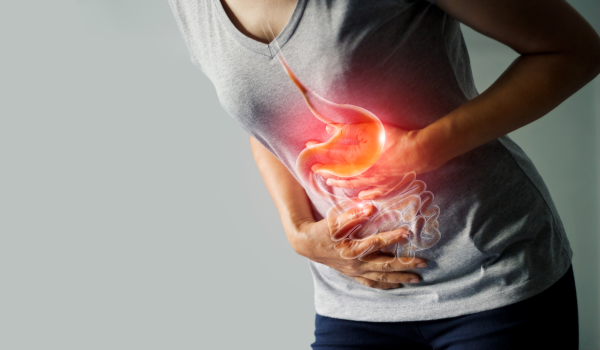What exactly is a
Stomach paralysis?
Gastroparesis is a medical condition in which the normal movement and emptying of the stomach is impaired. In the case of gastric paralysis, the muscles of the stomach do not function properly. As a result, food is not transported and digested through the stomach in the usual way. Typical symptoms of gastric paralysis are nausea, vomiting, a feeling of fullness, loss of appetite, premature satiety and unwanted weight loss. The condition can occur due to various causes, such as diabetes, neurological diseases, stomach surgery or side effects of certain medications. It is important that the disease is diagnosed and treated at an early stage. In this way, complications can be avoided and the quality of life of those affected can be improved. However, the disease is often underdiagnosed, but generally occurs relatively rarely.
About the symptoms
More information
Important facts about gastric paralysis

Symptoms and consequences of gastric paralysis:
- Feeling of fullness
- Flatulence and belching
- Abdominal pain and cramps
- Nausea and vomiting
- Loss of appetite and early feeling of fullness (even with small meals) and associated unintentional weight loss and malnutrition
- Poor absorption of nutrients (vitamins, minerals, calories)
- Fluid and electrolyte imbalance up to dehydration
- Metabolic disorders (especially in diabetes patients)
- Reduced quality of life and limited social activities due to symptoms
- Increased risk of further gastrointestinal complications
- Difficulties in the treatment of other diseases due to irregular drug absorption
What are the forms and causes of gastric paralysis?
The causes of stomach paralysis (gastroparesis) can be varied and are often related to problems in the stomach muscles or the nerves that control stomach movements.
Due to the various causes, different forms of the disease occur:
Diabetic gastroparesis
This occurs as a complication in people with diabetes. High blood sugar levels can affect the nerves that control stomach movement, leading to impaired gastric emptying.
Idiopathic gastroparesis
The cause of this form of gastric paralysis cannot be clearly determined. These are cases where no specific underlying disease can be identified.
Postoperative gastroparesis
Sometimes an operation on the stomach or surrounding organs can lead to temporary or permanent gastric paralysis.
Neuropathic gastroparesis
It is caused by nerve damage that can impair normal gastric motility, for example as a result of nerve diseases such as Parkinson's, multiple sclerosis or certain neuropathic disorders.
Drug-induced gastroparesis
Certain medications, such as opioids or certain antidepressants, can slow down stomach movement and lead to temporary or persistent gastroparesis.
Other causes
Viral or bacterial infections, hormonal disorders and eating disorders (e.g. anorexia nervosa or bulimia) can also affect the stomach muscles and lead to gastroparesis. As a rule, they are not assigned to a specific "own" form of gastric paralysis. Instead, they usually fall under the general causes or triggers and can therefore be assigned to one of the forms already mentioned.
This occurs as a complication in people with diabetes. High blood sugar levels can affect the nerves that control stomach movement, leading to impaired gastric emptying.
The cause of this form of gastric paralysis cannot be clearly determined. These are cases where no specific underlying disease can be identified.
Sometimes an operation on the stomach or surrounding organs can lead to temporary or permanent gastric paralysis.
It is caused by nerve damage that can impair normal gastric motility, for example as a result of nerve diseases such as Parkinson's, multiple sclerosis or certain neuropathic disorders.
Certain medications, such as opioids or certain antidepressants, can slow down stomach movement and lead to temporary or persistent gastroparesis.
Viral or bacterial infections, hormonal disorders and eating disorders (e.g. anorexia nervosa or bulimia) can also affect the stomach muscles and lead to gastroparesis. As a rule, they are not assigned to a specific "own" form of gastric paralysis. Instead, they usually fall under the general causes or triggers and can therefore be assigned to one of the forms already mentioned.
How is gastric paralysis diagnosed?
The diagnosis of gastric paralysis involves various steps to evaluate the symptoms, identify possible underlying causes and assess the function of the stomach. The diagnosis is usually made by a gastroenterologist or another specialized doctor.
The diagnostic procedures include a medical history and a clinical examination. The doctor will take a detailed medical history to ask about the symptoms and identify possible risk factors or previous illnesses. The physical examination can provide indications of impaired gastric emptying.
Blood
examinations
Blood
examinations
To rule out diabetes, electrolyte disorders and other underlying diseases.
Gastroscopy (gastroscopy)
Gastroscopy (gastroscopy)
To look directly at the stomach and detect any structural changes or inflammation.
Gastric emptying
studies
Gastric emptying
studies
To assess the speed at which the stomach empties food.
Manometry
Manometry
To measure the pressure and muscle activity in the stomach.
Electrical
gastrogram (EGG)
Electrical
gastrogram (EGG)
To record the electrical activity of the stomach muscles and thus detect abnormalities in stomach movement.
What to do in the event of stomach paralysis?
Change in diet and fluid intake
Eat smaller and more frequent meals to put less strain on your stomach. Also, choose easily digestible foods such as soups and purees to aid digestion and avoid high-fat, high-fiber and highly seasoned foods as they can slow down gastric emptying. Make sure you drink enough fluids, but avoid drinking too much during meals so as not to impair digestion.
Lifestyle and behavioral changes
Take your time at mealtimes, chew thoroughly and eat slowly to aid digestion. Stay upright after meals or move slightly to promote gastric emptying.
Also use relaxation techniques such as meditation, yoga or breathing exercises to manage stress and carry out regular physical activity to aid digestion and stomach movement.
Medical treatment options
The treatment of gastric paralysis includes drug therapies with prokinetics that promote gastric emptying. In some cases, endoscopic procedures such as dilatation or stent placement are used to treat constrictions. In severe cases, surgical intervention may also be considered to improve gastric emptying or treat complications. The choice of suitable treatment should be made in close cooperation with a medical specialist in order to alleviate the symptoms and prevent possible complications.
Sources
Please note that all content provided regarding individual medical conditions, treatments, procedures, etc. is general information and may vary depending on the physician:in and individual case and initial situation.
For more detailed information, please always consult your doctor.
Nat Rev Dis Primers. 2018 Nov 1;4(1):41. DOI: 10.1038/s41572-018-0038-z
Ganesh S. Aswath; Lisa A. Foris; Ashwini K. Ashwath; Krunal Patel. Diabetic Gastroparesis. StatPearls
Piper, W.: Internal Medicine. Springer, Berlin 2013
Clin Exp Gastroenterol. 2018 Sep 25;11:347-363. doi: 10.2147/CEG.S131650.